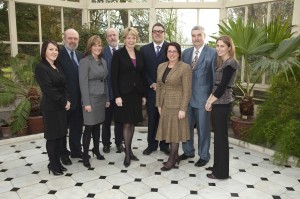Tánaiste launches major report on entrepreneurship education in third level sector
The Tánaiste and Minister for Enterprise, Trade and Employment, Mary Coughlan TD, recently launched a major new report on entrepreneurship education in Ireland. Titled Entrepreneurship Education in Ireland – Towards Creating the Entrepreneurial Graduate, the report investigates the current state of entrepreneurship education in higher education in Ireland.
The report was researched and written by the Higher Education Authority (HEA) funded Strategic Innovation Fund (SIF) Accelerated Campus Entrepreneurship (ACE) consortium – an innovative collaboration between Institute of Technology Blanchardstown, Cork Institute of Technology, IT Sligo and NUI Galway. The consortium is led by Dundalk Institute of Technology.
IT Sligo ACE Initiative team (l to r) Orla Mongey, Student Intern, Terry Young, Head of
School of Business & Humanities, Cait Keaveney, Student Intern, Frank Carter
Head of Department of Mechanical & Electronic Engineering, An Tánaiste, Mary Coughlan, John Kane, Lecturer, Roisin McGlone, SIF ACE representative & Lecturer, Pat Scanlon,
Head of Department of Business and Lisa Dunne, Lecturer who attended the recent launch.
Examining practices across almost the entire third and fourth level sector in Institutes of Technology and universities, the SIF ACE initiative aims to develop a range of educational programmes that will create entrepreneurial graduates who can generate indigenous employment or deliver benefit to employers of all kinds.
Key findings of the report suggest that:
- 78% of undergraduate students surveyed expressed an interest in starting their own business at some point in future;
- Entrepreneurship education is not readily available to all students, is fragmented and delivered mainly only in business schools;
- There is a lack of communication about, and visibility of, entrepreneurial supports and policies;
- There is insufficient joined-up thinking between institutions, academics and practitioners;
- Despite some initiatives, industry engagement with the third level sector is neither widespread nor intensive;
- Entrepreneurship education is under-resourced and lacks an articulated strategic policy;
- Higher education institutions need to adopt a framework to embed entrepreneurship education across all disciplines;
- Experiential learning, not theory based lectures, will most benefit entrepreneurial students.
Welcoming publication of the report, the Tánaiste, Ms Coughlan said:
“Central to maximising the job creation potential of our investment in the smart economy is the fostering of a new entrepreneurial culture in Ireland. Key to achieving this is ensuring that, through our approach to education and training across all levels, we empower our workforce with the
confidence and skills set necessary so that each individual can be considered a potential entrepreneur. The GEM Reports have shown Ireland to be one of the most entrepreneurial countries in the world so we are building on a strong foundation. We must continue to work in strengthening this base, tackling obstacles such as the fear of failure and further embedding a wider societal appreciation of the importance of entrepreneurship.”
“The analysis contained in this report is an important first step for our third and fourth level institutions in identifying the gap that exists between the current reality and where the sector need to be in terms of entrepreneurial education. I welcome the report’s practical recommendations as to how this gap is narrowed and on how to further build bridges between academia and the enterprise. The report’s findings and recommendations will contribute greatly to the work underway in my own Department on the development of a National Entrepreneurship Strategy, which we will publish in the New Year.”
The SIF ACE project has worked to develop a range of educational programmes aimed at creating entrepreneurial graduates. These include:
- Student entrepreneurship intern programmes;
- Modules at various levels to develop and grow entrepreneurial mindsets and behaviours;
- New undergraduate and postgraduate programmes in entrepreneurship in engineering and technology areas as well as non-business disciplines such as care education and biomedical engineering.
IT Sligo student interns have gained invaluable experience on this programme. Pictured
are Cait Keaveney, student intern IT Sligo, Roisin McGlone, SIF ACE representative & Lecturer, IT Sligo and Orla Mongey, student intern IT Sligo
The ACE project also aims to create a forum for the sharing of knowledge and experience in the field across all institutions.
At a presentation to Presidents and senior personnel from across the sector before the report’s launch, Professor Paul Hannon, Director of Research and Education at the National College for Graduate Entrepreneurship (NCGE) in the UK, stressed the critical importance of visible leadership in successfully embedding entrepreneurship education across higher education. He also highlighted the need for the development of an entrepreneurial culture in the sector among management, academic staff and students at a time of diminishing state funds.
Further information:
Roisin McGlone
SIF ACE representative & Lecturer, IT Sligo
Mobile: 086 8395451
Tel: 071 9155352

